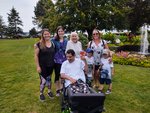





Lyric Bussani attended her step-brother’s funeral the day the U.S./Canada border closure to non-essential traffic was announced. This was the last time the 22-year-old would be in the same country as her family for a year, leaving her to mourn her brother alone in B.C., as many other Blaine community members felt ripple effects from the standstill border.
“My family feels like we have been robbed a year of our time,” she said. “We really hope to get that time back soon.”
A year ago this week, The Northern Light reported “Temporary restrictions at north border go into effect.” Unbeknownst to Bussani and her hometown, temporary would turn into 365 days with officials on both sides giving no end in sight.
Thirty-day extensions after the March 21, 2020 U.S./Canada border closure anguished many people with cross-border connections as months dragged on. Blaine residents with loved ones, some just 15 minutes away, stopped listening to the news altogether, while others checked headlines near the end of each month without hope. “May these gates never be closed” etched on the Peace Arch suddenly seemed obsolete, many people affected by the border closure voiced.
At first, concern arose with city finances. How would a town, experiencing an uptick in growth, survive with reduced revenue that relies on gas, lodging and sales tax largely funded by visitors?
The continued border closure and its impact on mental health became a concern for a community with close cross-border ties, Border Policy Research Institute director Laurie Trautman said.
“I think a lot of people have struggled emotionally during this pandemic and then you add on the layer of not being able to have the support of your loved ones there,” Trautman said. “You can’t necessarily quantify that impact but it’s a serious situation for a lot of people.”
Bussani, who lived in Blaine until she married a Canadian in 2018, used to cross the border six days per week to work at Steamers Espresso, attend church service on Sundays and visit her close-knit family. “Everything I do is in Blaine,” she said.
With the border still closed, Bussani said she has been unable to plan when she will be employed again. In addition to her step-brother’s death and employment uncertainty, Bussani packed her bags several times after hospital scares from her mom and grandmother. Not having a place or money to quarantine stopped her in her tracks.
“Life has not stopped moving,” Bussani said. “There have been so many things that have occurred in our family that you would never want to happen.”
Birch Bay resident Elizabeth Stewart-Gaines, 79, also experienced a hospital scare while separated from her Canadian family. Although she describes her situation as fortunate, Stewart-Gaines was admitted to the hospital in May for severe pneumonia that had doctors questioning if she would survive. Stewart-Gaines’ sons were denied entry at the border when they tried to visit her in the hospital. “I’m sure it’s happened to more people,” she said.
Blaine resident Laurie Hart, 64, said this was the first Christmas she has spent without her sister who lives in Canada. Hart said the holidays carry extra meaning for her family after her brother and his family were murdered on a fishing vessel in Alaska in the early ’80s. Traditionally, Hart stays up late on Christmas Eve filling stockings and drinking tea with her sister but this year, Hart said she had a good cry in the dark.
Other significant occasions occurred during the year such as the birth of Hart’s great-niece, Olivia Rose, and the second birthday of her great-niece Brooklyn, whom Hart visited immediately after her birth.
“It’s been really, really, really hard and sad to not hold the new babies,” Hart said, adding that both children were given the middle name Coulthurst to continue her family’s surname name that stopped with her brother. “I don’t have children of my own so these are like having my own kids.”
She’s watched her great-nieces grow older over Facetime. While watching the younger generation grow up, Hart said she also worries for her 86-year-old mother.
“We’re all just people and we want to be together with our loved ones. And they’re separating us,” said Hart, who can see the U.S./Canada truck crossing from her driveway. “I wish I had the right words for people to say, ‘Oh yeah, I get it.’”
Blaine resident Nancy Cook, 77, said having most of her family across the border left her without much support to take care of her 39-year-old grandson, Paul, who has multiple disabilities that require her supervision. During normal times, Cook said she and Paul spend at least one week in Canada every month helping family members with younger children and a granddaughter who was studying for vet school.
At the beginning of the border closure, Cook expressed to neighbors the difficulty of balancing watching Paul, who can’t wear a mask, and running errands like grocery shopping. Cook said her neighbors, the Merryweathers, have gone from being friendly faces to a second family that helps her pick up milk and spends time with Paul.
After having two family members pass away this year without being able to say goodbye, one of Cook’s grandchildren is expecting a child in July.
“I’m just praying something will happen before then because I want to meet my great-grandchild,” Cook said.
Cook said she motivates herself through this strained time by bringing bags of homemade cookies and chocolate cherry candies to family at Peace Arch Park.
“Being able to do that keeps me going,” Cook said. “The park has been a godsend for me.”
A majority of people with loved ones divided between the border expressed deep gratitude for the ability to hug family and friends at Peace Arch Park. One of those people is Ferndale resident Debbie Wharton, who visits the park at least once a month to share Tim Hortons’ timbits and play cornhole with her children.
The hardest part for Wharton was not having her two sons, one who lives with her in Ferndale and another who lives in Surrey, celebrate each other’s graduations from high school and college.
“Every month it breaks my heart,” Wharton said of the border extensions.
Erinn Andrews, who lives in Hope, B.C., also emphasized the hardship the border closure has had on her two teenagers, whose father lives in Birch Bay. Andrews said she made the tough choice last summer to homeschool her children so they could quarantine after visiting their father during month-long trips.
“The rules are so unclear,” said Andrews, admitting she still wasn’t sure how to properly quarantine. She said frequently quarantining has affected everything from her 17-year-old being able to maintain a job to adding significant stress to her family’s mental health.
“On top of the usual being isolated from everyone in the past year, not being able to leave the house every few months is a huge struggle,” Andrews said. “I used the word anxious a lot but anxiety doesn’t really do it justice. There’s a lot of emotions for all of us, including fear, sadness and mental exhaustion.”
Government officials at the county and state level pleading for special exemptions, considerations and relief have resulted in little action. Canadian prime minister Justin Trudeau said in a press conference Monday, “That’ll be eventually, but not for today” in reference to the border reopening.
Trautman said based on conversations she’s had with Canadian officials, the government could be looking at how to open the border for vaccinated U.S. travelers but opening the border hinges on more understanding if vaccinated individuals can transmit the virus.
“It sounds like a tepid response, but given how we’ve had almost no engagement or no conversation on lifting the restrictions in a real way over the past year, it does mark a turning point,” she said.
Over the past year, Bussani holds one memory closest to her: The first time she saw her mom after her step-brother’s funeral. They met at 0 Avenue on a sunny May day but were separated two feet by the ditch that runs between the two countries. After explaining their situation to the patrolling border agent, Bussani and her mother were allowed to embrace.
“I think about what the day the border will reopen will look like a lot,” she said. “The joy I feel, not even knowing when that comes, is not something I can express. When that day comes, I know it will feel like completion, that I have everything I need. We will be on the other side of what we have dealt with.”
Comments
No comments on this item Please log in to comment by clicking here